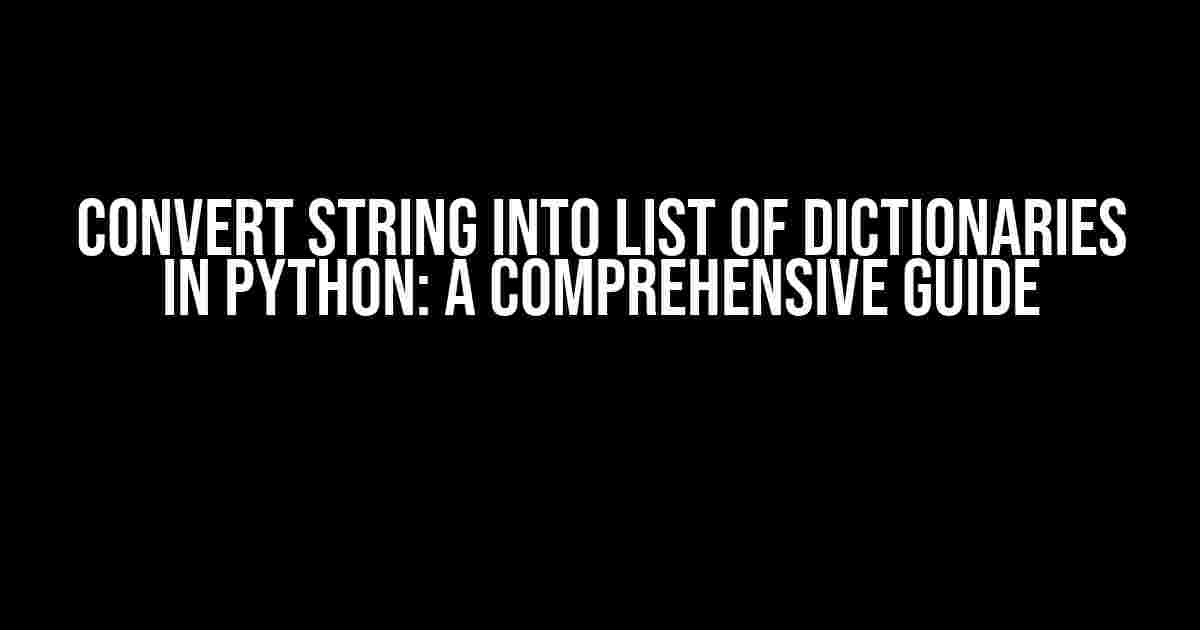Are you tired of dealing with cumbersome string manipulation in Python? Do you wish there was a way to effortlessly convert a string into a list of dictionaries? Well, you’re in luck! In this article, we’ll delve into the world of Pythonic wizardry and explore the various methods to achieve this feat.
Prerequisites
To follow along, you’ll need a basic understanding of Python and its data structures, including strings, lists, and dictionaries. If you’re new to Python, don’t worry! We’ll provide a brief refresher on these concepts before diving into the meat of the article.
Strings in Python
In Python, a string is a sequence of characters enclosed in quotes (either single quotes ‘ ‘ or double quotes ” “). Strings are immutable, meaning they cannot be changed once created. Here’s an example:
my_string = "Hello, World!"
print(my_string) # Output: "Hello, World!"
Lists in Python
A list is a collection of items that can be of any data type, including strings, integers, and even other lists. Lists are denoted by square brackets [] and are mutable, meaning they can be modified after creation. Here’s an example:
my_list = ["apple", "banana", "cherry"]
print(my_list) # Output: ["apple", "banana", "cherry"]
Dictionaries in Python
A dictionary is a collection of key-value pairs, where each key is unique and maps to a specific value. Dictionaries are denoted by curly braces {} and are mutable. Here’s an example:
my_dict = {"name": "John", "age": 30}
print(my_dict) # Output: {"name": "John", "age": 30}
Methods to Convert a String into a List of Dictionaries
Now that we’ve covered the basics, let’s dive into the various methods to convert a string into a list of dictionaries.
Method 1: Using the `split()` Method
The `split()` method is a simple way to convert a string into a list of substrings. By combining it with a list comprehension, we can create a list of dictionaries.
string = "name:John,age:30;name:Jane,age:25;name:Bob,age:40"
dictionaries = [dict(item.split(":") for item in pair.split(",")) for pair in string.split(";")]
print(dictionaries)
# Output: [{'name': 'John', 'age': '30'}, {'name': 'Jane', 'age': '25'}, {'name': 'Bob', 'age': '40'}]
Method 2: Using the `re` Module
The `re` module provides a powerful way to work with regular expressions in Python. We can use it to extract key-value pairs from a string and create a list of dictionaries.
import re
string = "name:John,age:30;name:Jane,age:25;name:Bob,age:40"
pattern = r"(\w+):([^,;]+)"
dictionaries = [dict(re.findall(pattern, pair)) for pair in string.split(";")]
print(dictionaries)
# Output: [{'name': 'John', 'age': '30'}, {'name': 'Jane', 'age': '25'}, {'name': 'Bob', 'age': '40'}]
Method 3: Using the `json` Module
If your string is in JSON format, you can use the `json` module to parse it into a list of dictionaries.
import json
string = '[{"name":"John","age":30},{"name":"Jane","age":25},{"name":"Bob","age":40}]'
dictionaries = json.loads(string)
print(dictionaries)
# Output: [{'name': 'John', 'age': 30}, {'name': 'Jane', 'age': 25}, {'name': 'Bob', 'age': 40}]
Method 4: Using the `ast` Module
The `ast` module provides a way to safely evaluate string literals as Python objects. We can use it to convert a string into a list of dictionaries.
import ast
string = "[{'name':'John','age':30},{'name':'Jane','age':25},{'name':'Bob','age':40}]"
dictionaries = ast.literal_eval(string)
print(dictionaries)
# Output: [{'name': 'John', 'age': 30}, {'name': 'Jane', 'age': 25}, {'name': 'Bob', 'age': 40}]
Real-World Applications
Converting a string into a list of dictionaries has numerous real-world applications, including:
- Data parsing and processing
- Configuration file handling
- JSON and XML parsing
- Data serialization and deserialization
- More!
Conclusion
In this article, we’ve explored four methods to convert a string into a list of dictionaries in Python. Whether you’re working with JSON data, configuration files, or plain text, these methods will help you simplify your code and make your life easier.
Remember, the key to mastering Python is practice, so be sure to try out these methods with different strings and dictionaries. Happy coding!
| Method | Description |
|---|---|
| Method 1: Using the `split()` Method | Simple and easy to implement, but limited to specific string formats. |
| Method 2: Using the `re` Module | Powerful and flexible, but requires knowledge of regular expressions. |
| Method 3: Using the `json` Module | Ideal for JSON data, but limited to JSON-formatted strings. |
| Method 4: Using the `ast` Module | Safe and easy to use, but limited to string literals that can be evaluated as Python objects. |
By the way, if you’re interested in learning more about Python and its wonders, be sure to check out our other articles and tutorials!
Frequently Asked Question
Get ready to unleash the power of Python and convert those strings into lists of dictionaries like a pro!
How do I convert a string into a list of dictionaries in Python?
You can use the `ast.literal_eval()` function in Python to achieve this. Here’s an example: `import ast; my_string = “[{\”name\”:\”John\”,\”age\”:30},{\”name\”:\”Alice\”,\”age\”:25}]”; my_list = ast.literal_eval(my_string); print(my_list)`. This will output a list of dictionaries `[{‘name’: ‘John’, ‘age’: 30}, {‘name’: ‘Alice’, ‘age’: 25}]`.
What if my string is not in a valid JSON format?
No worries! You can use the `json.loads()` function to parse the string into a list of dictionaries. However, make sure your string is in a valid JSON format. If it’s not, you might need to pre-process the string to make it JSON-compatible. For example, `import json; my_string = “[{\”name\”:\”John\”,\”age\”:30},{\”name\”:\”Alice\”,\”age\”:25}]”; my_list = json.loads(my_string); print(my_list)`. This will also output a list of dictionaries `[{‘name’: ‘John’, ‘age’: 30}, {‘name’: ‘Alice’, ‘age’: 25}]`.
How can I convert a string into a list of dictionaries with custom keys?
You can use the `csv` module to achieve this. For example, `import csv; my_string = “name,age\nJohn,30\nAlice,25”; my_list = []; reader = csv.reader(my_string.splitlines()); headers = next(reader); for row in reader: my_list.append({header: value for header, value in zip(headers, row)}); print(my_list)`. This will output a list of dictionaries `[{‘name’: ‘John’, ‘age’: ’30’}, {‘name’: ‘Alice’, ‘age’: ’25’}]`.
What if my string contains escaped characters?
You can use the `json.loads()` function with the `strict=False` parameter to parse the string into a list of dictionaries. This will allow the function to ignore escaped characters. For example, `import json; my_string = “[{\”name\”:\”John\\nDoe\”,\”age\”:30},{\”name\”:\”Alice\”,\”age\”:25}]”; my_list = json.loads(my_string, strict=False); print(my_list)`. This will output a list of dictionaries `[{‘name’: ‘John\nDoe’, ‘age’: 30}, {‘name’: ‘Alice’, ‘age’: 25}]`.
Can I convert a string into a list of dictionaries using a regular expression?
Yes, you can use the `re` module to parse the string into a list of dictionaries. However, this approach can be more complex and error-prone. For example, `import re; my_string = “name: John, age: 30; name: Alice, age: 25”; pattern = r”name: (?P



